- Home
- Charles de Lint
The Wind in His Heart Page 5
The Wind in His Heart Read online
Page 5
When I get to the turnoff to my place, the position of the sun tells me it’s taken me an hour and a bit, more or less. Just as it always does.
The new trail winds between walls of rock until it deposits me into the hollow behind my trailer. From where I stand, there’s just a short cave-length to the ledge where the trailer sits.
This hollow’s an odd little place, no bigger than a decent-sized backyard, and it doesn’t matter how hot or cold it is in the canyon itself or out on the mountain ridge trails, the temperature in here always seems moderate. It’s like it has its own little microclimate.
There’s a spring-fed pool at one end, shaded by a pair of sycamores. The other end gets all the sun and that’s where Possum set up the garden I still maintain. I’ve got corn growing there, carrots, peas, peppers, beans, all kinds of squash. On a raised bed to one side there’s a selection of herbs.
Behind the trees, and between the pool and the rock face, is a tall gap in the rock that gives an overview of the valley. Years back, before I knew him, Possum set up a wooden bench there to watch the sunset, and I still come up to do the same thing. I like to watch the moonlight too—full moon, especially, when the shadows grow across the desert floor and it feels like you’re looking out on some whole other world.
I’d like to settle down on the bench for a while right now, but I’m too curious about Morago’s mysterious request, so I leave the hollow to walk down a short, natural stone stairway, past the cistern and into the cave. A few moments later I emerge on the ledge where the trailer sits.
Damned if I know how Possum got it up here. He’d have to have had it hoisted up with a crane because the bottom of the canyon’s a good ten feet down from the lip of the ledge and the trailer’s a full-size Airstream. An overhang keeps the worst of the sun off of it and there’s room between the trailer and edge for a picnic table and fire pit. Everything in the trailer runs on propane. When I need a new tank, Reuben Little Tree delivers it by ATV, though we have to haul it up by hand from the canyon floor.
But the damnedest thing of all is how people climbing up the canyon just never notice the trailer. I can be sitting on the picnic table playing my guitar and they don’t even look once in my direction. When I asked Possum about it he just shrugged and said something about how sound doesn’t always carry the way you’d think it would in these mountains, and the trailer was just at the wrong angle to be seen from below. Except I’ve been down there looking up and had no trouble spotting it. Truth is, I’d be hard pressed to ignore that big shiny tube on wheels sitting on a ledge where it has no godly right to be.
I go into the Airstream and grab a bottled water from the fridge, then pull out a roll of maps from where they’re wedged in between the bookcase and the wall. Outside, I find the one I’m looking for and spread it open on the picnic table, holding the corners down with stones. I use my finger to trace the distance from the rez to the trail that took me into the hollow.
Son of a bitch. That can’t be right.
Frowning, I retrace the route, but even careful measurement doesn’t change a damn thing.
I decide to change tack. I find the spot where Sadie’s father dumped her in the desert and follow the route we hiked to the ride trail into the rez. We walked about three hours, and that’s pretty much what the map tells me it should have taken. So what gives with my route back to the trailer?
If the map’s to be believed, it should also have taken me three hours to get here. Three times as long as it actually did.
Somebody’s messing with me. I’d blame it on the map, except I bought it myself and I know it’s accurate. I just never traced this particular route on it before. So that leaves Morago. But why the hell would he trick me?
“Whatcha doing?”
I almost drop my water bottle at the sound of Calico’s voice. She saunters from the cave and drops down on the bench across from me. A bushy tail swishes behind her, stirring up dust. She’s got a teasing smile that reaches all the way up to her eyes.
“So I guess I’m not all that bright,” I say.
She cocks an eyebrow.
“I mean, Aggie tells me some of the other people I’ve met out here are ma’inawo, like you.”
“That’s true,” she says, “but why would it bother you?”
“How do I even know what’s real and what isn’t?”
“Do you want a practical answer or a philosophical one?”
I sigh. “Just one I can understand.”
“And when you put it like that,” she says, “do you really mean you want to understand, or that you want to believe?”
“Both, I suppose.”
“That’s not easy. For forty-some years you’ve already proved yourself pretty obstinate about ignoring what’s right in front of your face.”
I rub my face. “Maybe I’m having a flashback.”
“See? There you go again. That’s what you thought I was until I did some pretty convincing things to prove otherwise.” She gives me a knowing smile.
I reach across the table and run a finger down the short curve of one of her horns like I have a hundred times before. No, I’ve never been imagining her. But I’ve never questioned the mystery of her, either.
“So what are you?” I ask.
“What did I tell you the first time we met?”
“You said you were ma’inawo. That your mother’s deer, father’s fox.”
“That’s still true.”
“But ma’inawo’s not a tribal name. It’s Kikimi for cousin.”
“Still true,” she says. “That’s what the animal tribes call each other. Cousins.”
“So…what? A deer and a fox made out and had a little girl they called Calico?”
“Pretty much.”
“How’s that even physically possible?”
She laughs. “Well, they weren’t in their animal shapes, that’s for sure.”
“So your parents can look like humans or animals?”
She nods.
“And you look the way you do because your parents were different kinds of animals?”
“You mean this?” she says, touching a horn, then an ear.
I nod.
She laughs again. “No, I just look like this to mess with you. I figured sooner or later you’d realize that what you see is really what you get. But it turned out to be a lot later than I ever thought.”
My throat’s way too dry and I’m feeling a touch of vertigo. “So...” I pause to clear my throat, then gulp a slug of water. “What do you really look like?”
“Like this,” she says. “What you see. Or like this.”
Suddenly, instead of the foxalope girl leaning toward me with her elbows on the picnic table, she becomes a pointy-faced fox, dark-eyed gaze fixed on mine. Then the fox is gone and a small antelope stands on the table top and seat, like she’s perched on the red rocks of the canyon. “Or like this,” she says. Finally, she’s Calico again, except now she looks completely human. No horns, no fox ears, no tail.
I close my eyes and lay my head on the table, my cheek pressed into the map. “I’m losing my fucking mind.”
“What makes you say that?” she asks.
“Well, it’s either that, or I’ve been living a lie,” I say.
“None of it’s a lie. Cousins can’t lie, so I’m telling you the truth. You need to take the world out of the box you put it in and accept it for what it is, not what you want it to be.”
I open an eye to look at her. “Really?” I say. “My life goes batshit and that’s your advice?”
She looks puzzled. “Batshit?”
I sit up and jab a finger on the map. “What about this?” I ask. “The fact that it takes me an hour and a bit to walk what should be a three-hour hike if you go by the map.”
“Oh, this place. That’s another story. A long one.”
“I’ve got the time.”
She cocks her head. “You know, Possum took all of this a lot better than you.”
“
Was he your lover before me?”
She smiles. “No. He hooked up with my aunt—on my mother’s side. The antelope side.”
I lay my head back down on the map and let out a groan.
“Okay,” she says, brushing her hand along my cheek for a moment. “Apparently you’re not. Taking it well, I mean.”
She rests her chin on her hands so that our faces are only inches apart.
“Possum first showed up here in the early 1900s,” she says. “I guess he must have been in his early twenties.”
The rational part of my brain does the math, but I don’t call her on how impossibly old that would have made him. I just let her words wash over me and try as hard as I can to keep an open mind.
6
Sadie
Sadie sat and stared at Aggie’s computer screen, trying to process what she’d discovered.
It hadn’t been hard to find news stories about Steve’s grandmother. She hadn’t even needed the woman’s surname because there’d never exactly been a rash of women named Sadie in Texas who’d gotten the death penalty for murdering their husbands. What she hadn’t expected was how easy it would be to find out Steve’s full name and why he was hiding out here in the mountains.
Make that Steve’s real name.
Jackson Cole. Steven was only his middle name.
The big news was that he just happened to have been the lead singer of the Diesel Rats, as well as their principal songwriter and guitarist.
Who died in a plane crash over the Atlantic twenty years ago, but his body had never been recovered.
Of course it wouldn’t have been recovered, Sadie thought. Because he’d never died. Instead, he was living here in the middle of nowhere. Add on a few years, and the pictures she found online looked exactly like younger versions of the man she’d met after Reggie booted her out of his car.
Why would he hide his identity? Better yet, what the hell was he doing here? If he needed to get away, shouldn’t he be kicking it back on some tropical beach? If she had his kind of money she’d be living high on the hog. She’d have the best of everything. Mansions and a private jet and fabulous clothes and jewellery—all the things that super rich people had.
And he had to have been rich, because the Diesel Rats were mega huge in their day. Still were, even if their singer had “died” and they hadn’t made a new recording in forty years. They’d sold hundreds of millions of records worldwide—like Michael Jackson numbers. Even she’d heard their music before, and not just the famously sampled riff from “Burning Heart” that helped DJ Krash take his “Dontcha Mess with Me” to number one last year. You couldn’t turn on an oldies station without hearing something by the Rats over the course of a couple of hours. “Gimme, Gimme, Gimme.” “Jenny Don’t You Cry.” “Stars Are Falling.” And every Christmas there seemed to be a couple of new covers of “Peace Will Come (We Can Make It Happen).”
Maybe he took off because the press at the time wouldn’t let go of the fact his grandmother was a murderer. That she was one of only five women who’d been executed in Texas since the seventies. But really? How big an impact would something like that have made on his life in those days? They didn’t even have the Internet, so it wasn’t like it could go viral. Though, if back then was anything like now, she supposed the press would still have been all over him, especially since that hadn’t been the only thing to go wrong.
Not long after Cole’s grandmother was executed, Sully—full name, Frank Sullivan, according to Wikipedia—Steve’s best friend since childhood and the bass player in the band, was found dead of an overdose in his hotel room. Before the autopsy report could be delivered, Cole and his drummer Martin Getty had a huge falling out over whether or not the band should get a new bass player and continue. Cole wanted some time; Getty insisted they should finish the twenty dates left on their tour.
Getty had stormed out of the hotel where they were staying and died in a car crash an hour later, speeding on the Interstate.
Cole’s longtime girlfriend, Toni Shaw, chose that same period of time to walk out on him, citing that their relationship had become toxic. Later, she tried suing him for division of property, claiming she’d supported him through the hard times when the band was just getting started. It went to court, where it was revealed she’d been having an affair with the band’s business manager.
Cole went from rock ’n’ roll megastar to poster boy for tragedy, especially after he “died” as well.
Sadie found link after link to articles about the band and their music, and the mystery death of Jackson Cole. It was music-nerd city out there in the blogosphere. It was stupid, how much was still being written about the band.
Which, she realized, probably meant that proof he was still alive would be worth big bucks to somebody. God, how much? Ten grand? Twenty? Lots, she was sure.
Except who could you trust? One of the gossip sites? Or maybe a tabloid? But who was to say they wouldn’t stiff you?
There were lots of books on the band as well, and one name kept popping up in the reviews about them: Leah Hardin. She’d apparently written the definitive biography on Cole, as well as a whole bunch of other books on the band, their humble beginnings, how they handled fame, their influence. She even had a book that chronicled every recording session they’d ever done, which just seemed like overkill, as well as one that reviewed every bootleg.
And if that wasn’t enough, she also had a blog named after the band’s third album, Rats on the Run, which she seemed to update at least every week. She’d written about other bands, politics and all kinds of crap, but she kept coming back to the Rats.
Hello, Leah. Get a life or what?
What could possibly be left to say?
But that very fanaticism of hers might make her the best person to contact. The woman would at least get another book out of it. Hell, with the amount of words she seemed able to churn out on every stupid detail of the band’s life, she could probably get three or four.
There was an email contact link on the blog. Sadie clicked on it and composed her message. She thought for a moment before sending it, then used the camera on the laptop to take a picture of Aggie’s painting of Steve. She attached it to the email before pressing send.
Clearing the browser cache, she shut down the laptop.
When she stood up, the red dog got up as well.
“I’m going to be rich, Ruby,” she told it. “What do you think about that?”
The dog just stared at her.
Sadie had too much of a buzz on to stay cooped up inside. She went out to walk around Aggie’s property, the dog following on her heels.
7
Thomas
It was just past closing time, and Thomas was giving the store a final sweep when Reuben clapped him on the shoulder. “Hey, Thomas,” he said. “Can you make some deliveries on your way home?”
“I guess.”
“Great. You can just keep the truck until I see you at Aggie’s tomorrow night.”
Thomas grinned. Getting to keep the truck the whole next day would make the extra time worth it.
Reuben helped him load the deliveries. Thomas groaned when he saw the tall propane cylinder already strapped to the trading post’s ATV, which was tied in place in the back of the pickup. He’d never made a delivery to Steve Cole’s place. Reuben usually handled that.
“Really?” he said. “You want me to drive all the way out to Painted Cloud Canyon?”
Reuben smiled. “What’s it going to take? Forty minutes each way if you don’t speed too much. Another twenty to unload and get up to Cole’s place.”
“I don’t even know where Cole’s trailer is in the canyon.”
“Trust me. You can’t miss it. And I know how you love to drive my truck.”
It was a sweet ride, no question. A ’56 Chevy with a rebuilt engine that rumbled like a big old bear. The shocks were so good you barely felt the washboard bumps on the rez’s worst roads. And it had pickup to spare.
“Just don’t get a ticket,” Reuben added.
“Like the cops are ever out on Zahra Road.”
Reuben gave him a look.
“Okay,” Thomas assured him. “I won’t speed. Much.”
“That’s what I wanted to hear.” Reuben got into the passenger’s side. “You can drop me off at the community center on your way to Auntie Susan’s.”
Thomas looked at the list Reuben had given him. Susan Many Deer’s name was at the top of the list.
“No problem.”
* * *
On his way back to the highway after making all the deliveries in the rez, Thomas spotted his sister Santana sitting on a fence with a couple of her friends. He slowed down and honked at her. The girls started to give him the finger until they saw who it was, then Santana waved him down. When he came to a stop, she trotted over and leaned her forearms in the window on the passenger’s side.
“Are we taking Reuben’s truck to town tomorrow?” she asked.
He nodded.
“Sweet. Where are you going now?”
“Out Zahra Road to Painted Cloud.”
“Can I come?”
“So long as you call Mom first to tell her where you’re going.”
Santana grinned. She waved to her friends, got in and thumbed their home number on her phone.
“Hey, Naya,” she said to their sister when the connection was made. “Can you tell Mom I’m making a delivery with Thomas and we’ll both be back when it’s done?”
“Seatbelt,” Thomas said.
Santana stuck out her tongue, but she used her free hand to buckle up.
“Mom wants to know how long we’ll be,” she said.
“Under two hours, but not by much.”
“Two hours,” she said into the phone. “We’re going to Painted Cloud.” She listened for a moment then rolled her eyes. “Mom says to be careful,” she told Thomas, “because that’s a place where the deer women like to pick up unsuspecting suitors.”

 Widdershins
Widdershins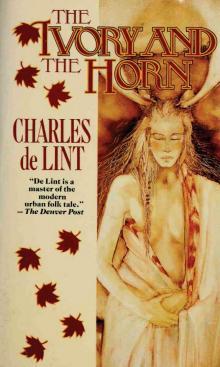 The Ivory and the Horn
The Ivory and the Horn Yarrow
Yarrow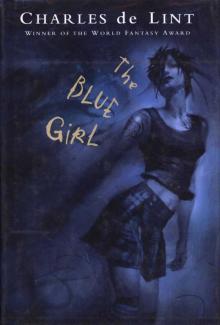 The Blue Girl
The Blue Girl Spirits in the Wires
Spirits in the Wires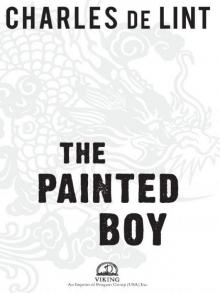 The Painted Boy
The Painted Boy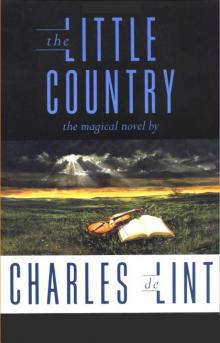 The Little Country
The Little Country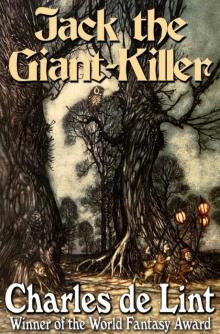 Jack of Kinrowan: Jack the Giant-Killer / Drink Down the Moon
Jack of Kinrowan: Jack the Giant-Killer / Drink Down the Moon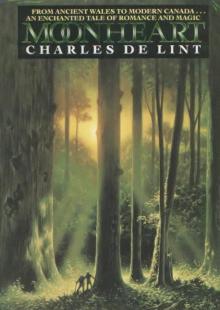 Moonheart
Moonheart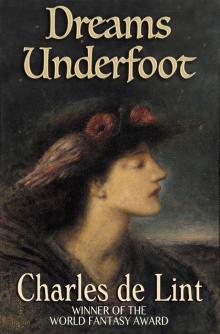 Dreams Underfoot
Dreams Underfoot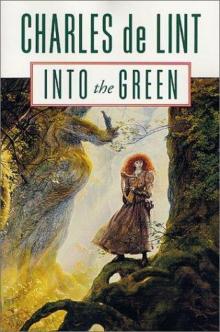 Into the Green
Into the Green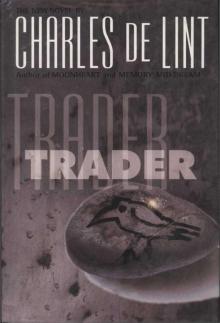 Trader
Trader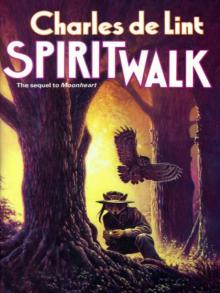 Spiritwalk
Spiritwalk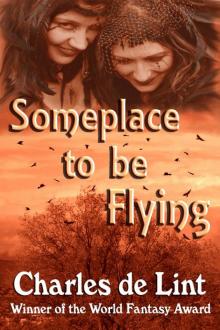 Someplace to Be Flying
Someplace to Be Flying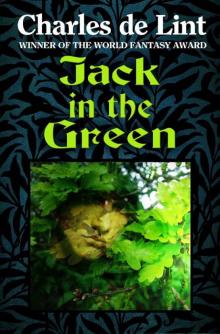 Jack in the Green
Jack in the Green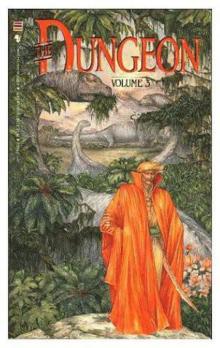 The Valley of Thunder
The Valley of Thunder Out of This World
Out of This World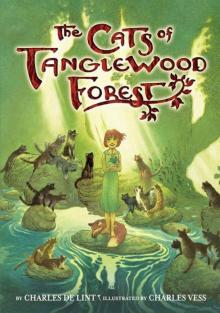 The Cats of Tanglewood Forest
The Cats of Tanglewood Forest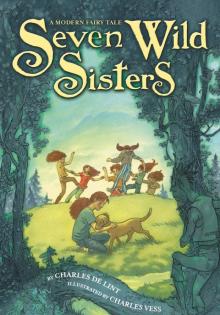 Seven Wild Sisters
Seven Wild Sisters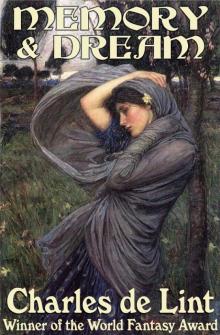 Memory and Dream
Memory and Dream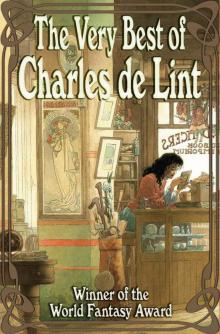 The Very Best of Charles De Lint
The Very Best of Charles De Lint Under My Skin
Under My Skin Forests of the Heart
Forests of the Heart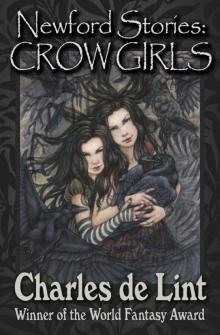 The Newford Stories
The Newford Stories Moonlight and Vines
Moonlight and Vines Angel of Darkness
Angel of Darkness The Onion Girl
The Onion Girl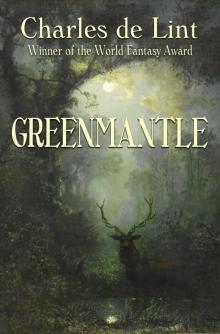 Greenmantle
Greenmantle Waifs And Strays
Waifs And Strays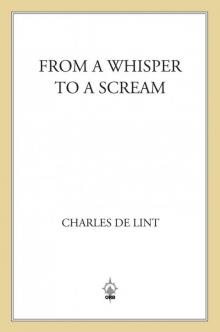 From a Whisper to a Scream
From a Whisper to a Scream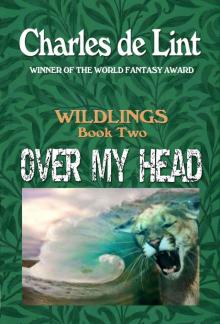 Over My Head
Over My Head The Ivory and the Horn n-6
The Ivory and the Horn n-6 Our Lady of the Harbour
Our Lady of the Harbour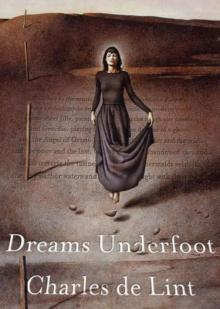 Dreams Underfoot n-1
Dreams Underfoot n-1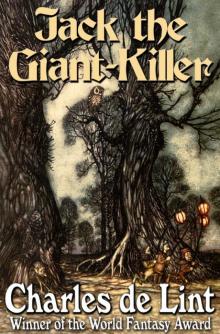 Jack the Giant-Killer (Jack of Kinrowan Book 1)
Jack the Giant-Killer (Jack of Kinrowan Book 1)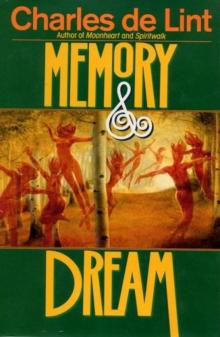 Memory and Dream n-5
Memory and Dream n-5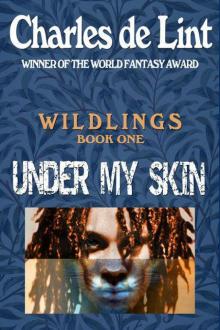 Under My Skin (Wildlings)
Under My Skin (Wildlings)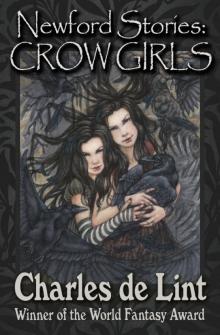 Newford Stories
Newford Stories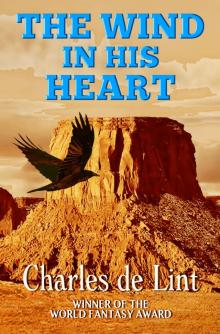 The Wind in His Heart
The Wind in His Heart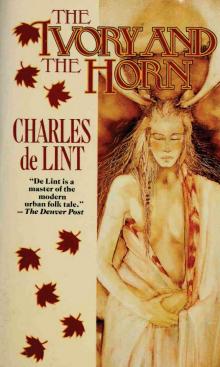 Ivory and the Horn
Ivory and the Horn